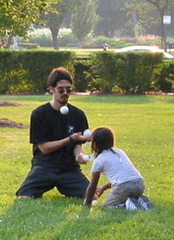Today was like that.
After a chilly night in Mae Salong (temperature dropped to around 50 degrees and without heat, you simply bundle up in multiple blankets and sweaters), I woke to the sound of the morning market. Looking out my window, the sky was just starting to light up and sun slowly peeking over the mountains in the horizon. I hastily got washed and made my way partially up the hill for a better view of the sunrise.
The morning market by now was in full swing. While small, it had a very nice feel, local, authentic, devoid of tourists and normal fanfare surrounding tourist oriented markets. You could watch people from the local tribes – Akhan, Luisa, and Lahu – trading, selling and purchasing goods much as they had done for decades, probably centuries. I bought a few bracelets as souvenirs and decided to collect them from any place that held a special place during my travels.
I left the market and returned to my guesthouse (which was essentially just a family’s home, where they rented out one room). The main host was playing guitar, and he had two guitars so we jammed and chatted for a little bit. After he left, a couple cute kids watched and listened as I played, and I decided this was a good time to introduce a little juggling in the fray. When I first started juggling, their faces simply lit up, entranced, and then giggling with joy. For the next hour or so, I juggled for the kids, trying to teach them the basics. They brought their parents and relatives, and the common area of the house had become quite a lively area. The best is always slowly building the relationship with the kids, where they might be a little shy at first, nervous around this strange “farang” (white man) in their house, until they loosen up and became relaxed, fighting with each other for a spot on my lap.

The kids had to leave for school, and I headed to the local tea festival. Initially, I had been worried when I arrived at Mae Salong because most of the guesthouses were full (I thought it might be flooded by tourists). It was flooded, but in a different way. Rather than Western tourists, it was mostly Thai tourists and mostly from surrounding villages for the annual several day long tea festival. It was still pretty early at that time, so I visited a nearby wat overlooking the valley. On the way back, the festival was in full swing. Dozens of food, tea, and souvenir stands. Various dance groups began to perform on the fairly large stage. I saw dances from the various nearby villages – Akhan, Luisa, Lahu, and one or two more. And amazingly, I was the only white face in the crowd.
Around noon, I needed to head to my next destination Tha Ton, so I found the minibus down to the Tha Ton bus station. The ride cut along the ridge of the mountain, sweeping around the curves with gorgeous views of the surrounding valleys. At the bottom, the overcrowded bus to Tha Ton was heading off, so I tossed my bag on top and grabbed onto the back of the bus or really pick-up truck. After a pretty ride, I found myself at Tha Ton.
Tha Ton is another really pretty town. Mostly one street, Burmese Shan refugees make up a substantial portion of the population due to Tha Ton’s proximity to Myanmar (and due to the outgoing violence against the Shan in Myanmar). Tha Ton is basically cut in half by the Maekong River, with a pretty bridge connecting the two sides, and towering mountains forming the background on either side. The main attraction is the various temples and Buddha statues on the mountain. In 9 stages, you walk or drive up the hill visiting the various sites. And they are definitely worth visiting. Probably even more spectacular than Mae Salong, the various statues are massive and ornate – the glimmering white sitting Buddha, the golden Buddha with dragons surrounding him, the massive multicolored stupa overlooking the valley and Maekong (with multiple levels and overlooks inside), and the famous standing Buddha (with its back turned towards Myanmar).



I spent the afternoon exploring the various sites, and returned to the stupa to watch the sunset.
All in all, it was a great day.
Tomorrow I head to either Chiang Mai or Phitsanoluk for New Years. I’m not sure which yet.
(PS. I'm starting to realize I blog in spurts... I'll have to work on being more regular with my posts)






























